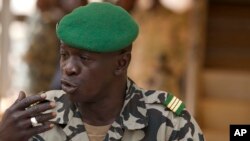The coup leader blamed for destabilizing Mali went on trial Wednesday with 17 co-defendants, accused of kidnapping and killing members of the presidential guard whose remains were later found in a mass grave.
Amadou Haya Sanogo, who rose to power after overthrowing Mali's longtime president in March 2012, could face the death penalty if convicted. He was arrested three years ago following the discovery of the 21 corpses.
Human rights groups say the victims, known as the red berets, were accused of trying to mount a countercoup against Sanogo a month after he seized power.
Family members of the victims — dressed in white in a sign of peace — hailed the start of Wednesday's trial as an important step.
“We have waited a long time for this moment,” said Sagara Bintou Maiga, president of the group representing relatives. “Today we want justice to be done.”
Another group of young people held up photos of Sanogo in a show of support for the former military strongman, whose trial is taking place 500 kilometers (310 miles) from the capital of Bamako.
“I don't think he's guilty of killing the red berets and I hope that he will be acquitted,” said Aboubacar Kante, who was among those who made the journey to Sikasso for the trial's start.
Witnesses have told Human Rights Watch that they last saw the red berets — bound and blindfolded — being loaded onto a truck in the middle of the night in May 2012. One witness later provided the group with a handwritten list of the victims' names.
While many other human rights abuse cases have not yet been pursued in Mali, Corinne Dufka called Wednesday's trial “clear progress in tackling the culture of impunity.”
“For far too long, men like Sanogo were considered untouchable and above the rule of law,” said Dufka, associate Africa director at Human Rights Watch. “Today, the victims and family members of those allegedly abducted and murdered by the defendants are one step closer to getting justice.”
The overthrow of Malian President Amadou Toumani Toure in March 2012 ushered in an era of chaos that allowed Islamic extremists to flourish in the country's far north. They later seized control of the largest towns, implementing their strict interpretation of Islamic law before a French-led military operation ousted them from power in 2013. Jihadists still remain active in the region three years later, frequently attacking Malian soldiers and U.N. peacekeepers trying to stabilize the north.










